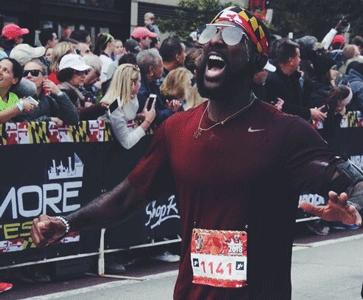Why run 26.2 miles? Why put yourself through the pain? Why spend a significant amount of time altering your daily schedule, sleeping habits and diet to accomplish this feat? Will you finish? What are you searching for?
These were just some of the thoughts in my mind while I was training for my first marathon in October 2018. As I researched, I began to see that this type of event is much more of a mental test rather than a physical one. In particular, the infamous “wall” is among the most difficult parts of the race that many runners hit around mile 18.
Hitting the “wall” refers to the point where the human body depletes all of its “stored glycogen and the feelings of fatigue and negativity, which typically accompany it.” Glycogen is a carbohydrate stored in our muscles and liver to give our bodies energy. When the body runs low on glycogen the “brain wants to shut down activity as a preservation method, which may lead to negative thinking,” causing the well-known “wall.” I realized this was a test of true mental fortitude.
As the Chief Creative Optimist at Positively Caviar, Inc. my team and I are constantly developing activities for our self-empowerment workshops with the goal of increasing mental resilience in our attendees. We have studied the importance of good habits, self-talk, self-confidence and self-love.
These qualities and more have a significant influence on how one is able to overcome adversity. I not only wanted to understand the knowledge but also utilize it and apply it in my own life.
Practicing what I speak about is very important to me to ensure that I am authentic and genuine. I believe authenticity can only be developed by true experience. I believed running 26.2 miles was the perfect experience that I needed to battle my own mind and put to test the research built into our own workshops.
It was finally race-day. It wasn’t until mile 20 that I had my first taste of the “wall.” My toenails sore, my knees and lower back were in agonizing pain and I still had five miles to go. I realized that for the past three months I was preparing my mind for this one moment— I was totally depleted. During that moment of pain and lack of energy, I remained keenly conscious of the conversations in my head. This moment stripped me down to my deepest fears, self-doubt and insecurities. With each step, my brain came back to one question: Why?” Why are you continuing to put one step after the other? Why are you putting yourself through this mental and physical suffering to finish this race?
During times of adversity and goal setting, I realized the mind always searches for the path of least resistance. During these moments, the mind will keep asking you one question— why? This is the same “why” that I heard during my race. It’s in moments like these that you must have an answer to this question and learn to suppress the voice in your head that tells you to stop or that you can’t do something. This is a voice that nearly all of us have heard before while trying to attain a goal, in times of suffering, working out in the gym, studying for a test, or even washing the dishes. You must have the will and a “why” to overpower and fight that voice in your mind that tells you to rest or that you can’t do something. The more you learn to shut down that voice, the better you become at overcoming obstacles in your life. Your mind is like a muscle and over time you will improve your mental threshold for tolerating pain and discomfort. This is mental fortitude and resilience.
During the race, I learned two things about life— it’s imperative to have a “why” and that mental and physical discomfort are inevitable while attaining a goal. You must have a strong enough “why” to leverage as strength and courage to endure any obstacle. This is the determining factor in giving up or succeeding in every facet of life. I had an answer for my “why” during that race. I answered the question, pressed forward towards my goal and finished my first marathon under my target time. It was the worst pain my body had ever endured but also one of the greatest, most peaceful moments of my life.
“He who has a why to live for can bear almost any how.” — Friedrich Nietzsche
